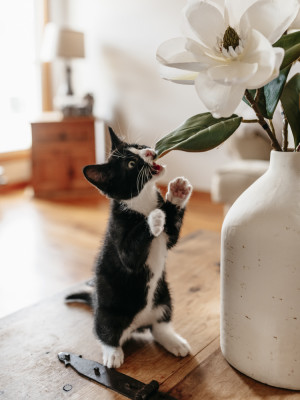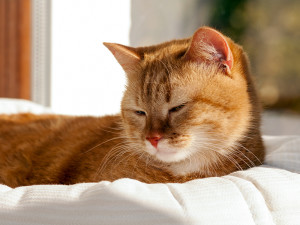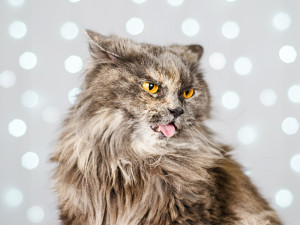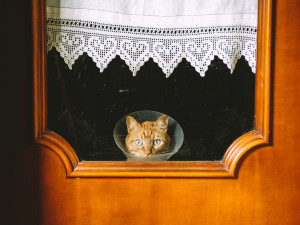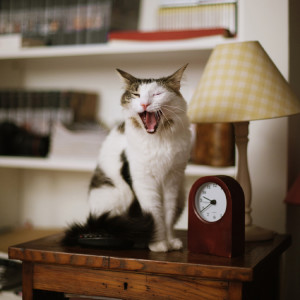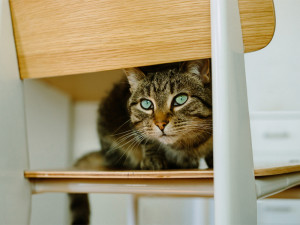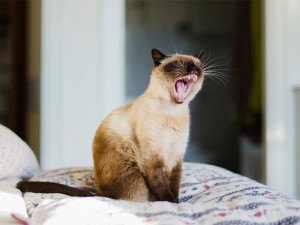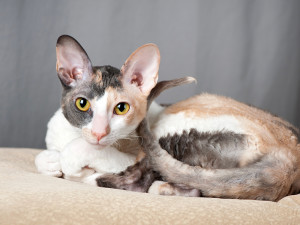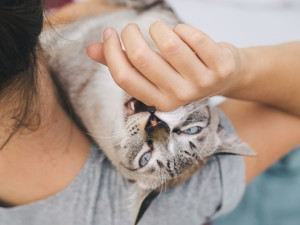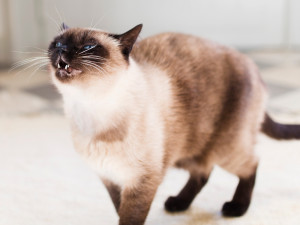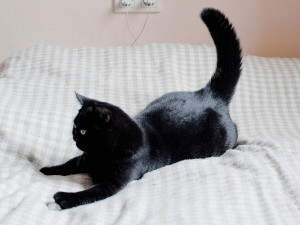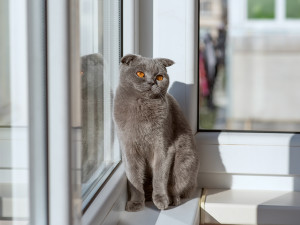Why Does My Cat Chew On Everything?
How to decode your cat’s chewing habits when they’re nibbling on all the things.
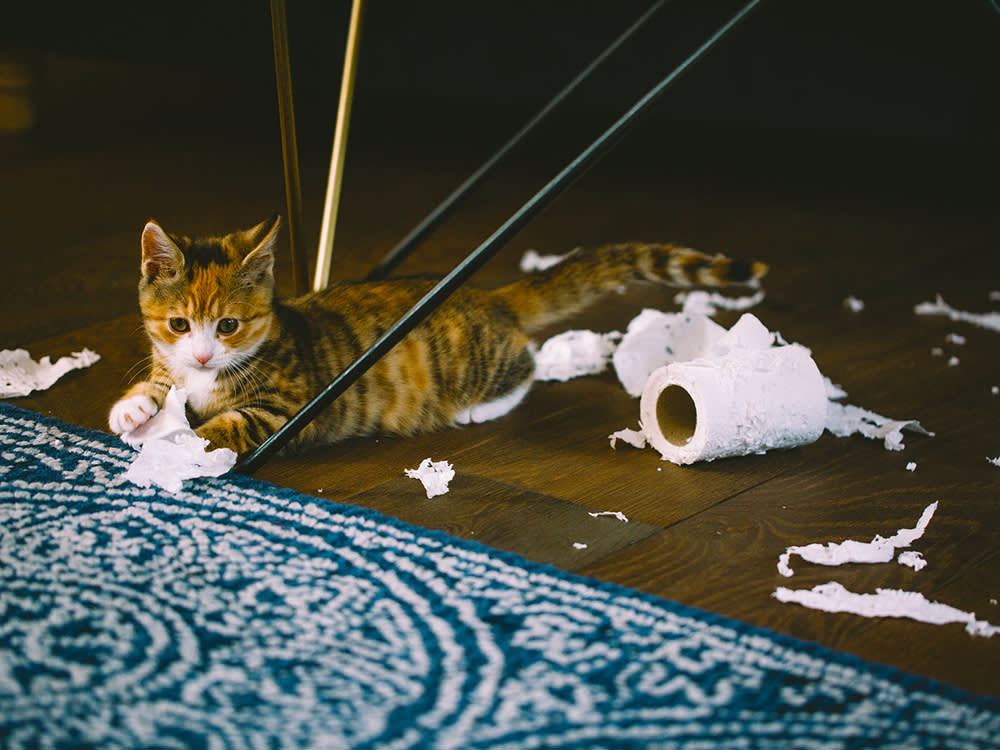
share article

Your pet wants you to read our newsletter. (Then give them a treat.)
Have you ever caught your cat chewing on your shoelaces, munching on your houseplants, or treating your phone charger like a gourmet meal? You’re not alone. While your kitty’s gnawing habits might appear mysterious, there are actually a ton of reasons behind those toothy adventures. From their inherent instincts to moments of boredom, anxietyopens in a new tab, or even a dental dilemmaopens in a new tab, cats have a variety of motivations for their chewing exploits.
A nibble here and a nibble there may seem like innocent fun, but excessive chewing could point to an underlying medical condition. Not to mention, this seemingly harmless habit can become dangerous quickly if your kitty gets their paws on the wrong thing. Thankfully, there are ways to prevent it. Increasing enrichment and activities, providing them with dental treats and chew toys, and redirecting their attention are all simple ways to mitigate chewing. Of course, if your cat’s chewing is severe, it’s best to consult with a veterinarian or a certified animal behaviorist.
Whether your cat’s chewing habits are all in good fun or something potentially serious, let’s demystify this peculiar behavior before your feline friend makes your sofa their go-to chew toy.
Is chewing normal for cats?
Cats have many quirky behaviors, and chewing is no exception — but there are many situations where cat chewing is perfectly normal. In fact, their eating habits play a significant role in this phenomenon. Cats are true carnivores, which means their bodies are finely tuned for a diet primarily composed of meat. This inherent preference for animal-based meals not only influences their food choices, but also their penchant for nibbling on non-food items.
Cat eating habits
A cat’s eating habits and chewing behavior are closely related; both are intertwined with their natural instincts and dietary needs. Because their bodies are built for a meat-heavy diet, chewing and tearing through prey, such as birds or rodents, is an essential part of their natural hunting behavior. Even domesticated cats retain these instincts...sometimes rather unfortunately for you.
Your cat’s diet can also influence their chewing habits. Cat parents know that their kiddos can be very picky, and many have particular preferences for certain textures or flavors. You may notice your cat chewing more if they enjoy the sensation of a specific type of food or treat.
Chewing on non-food items
If you catch your cat munching on things that are definitely not food, don’t worry. There are plenty of times when this is totally normal. For starters, kittens are avid explorers, and chewing is their way of getting to know the world. It’s all part of the learning process. Then there’s teething; just like human babies, kittens go through it, too, and chewing can help soothe their sore gums during this phase.
As they grow, it can also help keep those pearly whites in tip-top shape and improve their dental health. Chewing also taps into a cat’s natural hunting instincts. So, if you catch your cat nibbling on a toy or a cardboard box, chances are they’re just embracing their inner predator. Lastly, there’s a strong possibility that good ol’ boredom is to blame for your cat’s chewing. As much as our cats can entertain themselves (much to our amusement), sometimes they need a little extra something to keep them stimulated.
Other reasons cats may chew
While there are some pretty legit reasons for cat chewing, like their hunting instincts and love for meaty treats, there are situations when cat chewing takes a detour into not-so-normal territory.
Pica in cats
Have you ever noticed your cat munching on things like fabric, plasticopens in a new tab, or plants? It’s a behavior known as pica. This intriguing phenomenon involves cats consuming, chewing, or sucking on non-nutritive items, and researchers have been curious about what drives it. Some theories suggest boredom, a lack of social interaction, or perhaps a lingering hunting instinct. Others think genetics or early weaning might play a role. But it’s not a one-size-fits-all situation. Cats with pica vary in their behaviors, with some vomitingopens in a new tab more frequently or having an unusually hearty appetite.
Although no one’s conducted a deep-dive study into the medical conditions that might trigger pica in cats, there’s been some interesting talk on the subject. It turns out, certain immune conditions and contagious illnesses have been linked to cats chewing on non-food items, but these studies don’t include information about what was ingested and how. What we do know is that the consumption of non-food items can have relatively serious consequences. Potential concerns linked with pica in cats include:
Digestive blockages: If your cat decides to ingest items like string, rubber bands, or small objects, there’s a risk of these items causing blockages in their digestive system. These blockages can be quite serious and even life-threatening.
Toxicity: Some non-food items can be toxic to cats. For instance, certain plantsopens in a new tab or chemicals can lead to poisoning and result in severe health issues.
Dental damage: Chewing on hard or abrasive objects can lead to dental problems like tooth damage and wear, causing pain and discomfort.
Nutritional deficiencies: If your cat’s more into chewing random objects than their actual food, they might miss out on some important nutrients, leading to nutritional imbalances or deficiencies.
Risk of injury: Cats can choke or inadvertently harm themselves when attempting to chew or swallow non-food items.
If you’re seeing signs of pica in your cat, it’s a good idea to contact your veterinarianopens in a new tab or an animal behaviorist to get an accurate diagnosis and get your cat the help they need. Treatment may involve dietary changes, behavior modifications, or medication to treat an underlying condition.
Cat periodontal disease
Chewing can be a way to soothe sore gums if a cat’s experiencing dental pain, or more seriously, periodontal disease. Periodontal disease is a bacterial infection that causes swelling, pain, and sometimes even tooth loss. It can be very painful, so your feline might look for anything to nibble on to get some relief. Keep your eyes peeled for other signs of periodontal diseaseopens in a new tab, including consistent bad breath, pawing at their mouth, difficulty chewing, excessive drooling, changes in weight or appetiteopens in a new tab, tooth loss, and red, swollen, or bloody gums.
If you notice any of these signs, reach out to your veterinarian and they can examine and treat your cat appropriately. While periodontal disease is unfortunately not treatable, they may suggest a thorough cleaning and regular oral health checkups to prevent any further damage. You should also make teeth brushing and dental treats a regular part of your weekly routine to keep those chompers healthy.
Obsessive compulsive disorder
Excessive, repetitive chewing can signal Obsessive Compulsive Disorder (OCD) in cats, which is when your cat engages in repetitive, compulsive behaviors that are often triggered by stress or anxiety. When your kitty just can’t stop the chewing marathon, it might turn into a habit that doesn’t even need a reason to keep going. That’s because their brain gets into the habit of releasing pain-relieving chemicals and reinforces the behavior.
Although a cat’s age or gender doesn’t seem to be a factor in having OCD, there are some breeds that are more predisposed to the disorder. Siamese and other Asian breeds, for example, often stand out for their tendency to engage in repetitive behaviors like meowingopens in a new tab and fabric-chewing. If you start to notice signs of cat OCD, a vet or animal behaviorist can help relieve some of the symptoms, whether that’s through enrichment and lifestyle changes, behavioral therapyopens in a new tab, or medication.
Common items cats chew
Cats are curious creatures, so while they’re susceptible to exploring literally anything with their mouths, there are a few items that cats tend to chew on more:
String or tinsel
Rubber bands
Fabric
Plants
Cat toys
Plastic
Cords and wires
Furniture
The ones to keep your eyes peeled for are long, string-like objects that can wrap around their intestines or things that can become choking hazards. Aside from toxic food and plants, these tend to be the items that cause the most harm when our feline friends ingest them.
Can cat chewing be dangerous?
While a munch here and there is totally normal and safe, the risks of cat chewing increase when it starts to cross certain boundaries, both for your feline friend and the environment they live in. For starters, your cat can face dangerous health issues if they start to nibble on the wrong thing. Objects like strings, rubber bands, or even small toys can cause blockages in their digestive system.
This is not only painful but can be life-threatening if not addressed quickly. Then there’s the concern of toxicity. Some non-food items can be downright harmful if ingested. Toxic substances, like certain plants or household chemicals, can lead to poisoning, which requires immediate medical attention.
Beyond the health risks to your cat, there’s the potential for damage to your home environment. Chewing on electrical cords can not only harm your pet but also create safety hazards like electrical fires. Furniture and other valuables can take a major hit, too. So, while a bit of cat chewing can be cute and harmless, it’s a good idea to keep an eye on it. If it starts to escalate into risky territory, it’s time to take action to protect your cat and your home.
When should I seek professional help for my cat’s chewing behavior?
You’re the expert when it comes to your cat, but there are moments when seeking professional help for your cat’s chewing quirks is a wise move. Here’s when to consider reaching out to a vet or animal behavior specialist:
Excessive or destructive chewing: If your cat’s chewing antics are turning into a full-blown furniture demolition or they’re treating cords like spaghetti, it’s a sign to get some expert advice. This kind of behavior isn’t just about a playful kitty anymore; it can be a real headache and even a safety issue.
Ingesting non-food items: When your cat starts munching on things they shouldn’t swallow — like strings, rubber bands, or tiny toys — that’s when the alarms should ring. Those objects can lead to serious digestive distress, and we don’t want that.
Obsessive chewing or repetitive habits: If your cat’s chewing seems more like an obsession and they’re stuck in a loop with other repetitive behaviors, it’s time to chat with a pro. It could be a sign of underlying issues like anxiety or OCD.
Sudden chewing changes: If your cat’s chewing habits take a U-turn out of the blue, it’s worth checking out. Like, if they were never into chewing and now they’re going at it like a champ — that’s a red flag.
Chewing discomfort or pain: If your cat looks uncomfortable, in pain, or has strange reactions while chewing (think pawing at their mouth, excessive drooling, or meowing in distress), it’s time to dig deeper. Dental problems or other health issues might be lurking.
Persistent bad breath: Cats usually don’t have minty-fresh breath, but if your feline’s mouth consistently smells like something out of a horror movie, it’s a sign to get them checked.
Professional help isn’t just for the big stuff. What appears to be a harmless chewing habit could turn serious quickly, so when in doubt, give a vet or a pet behavior specialist a call.
How to prevent cat chewing
Despite all the weird ways this peculiar behavior manifests, thankfully, there are a few preventive measures for cat chewing that can make all the difference.
Provide appropriate chew toys: Cat toys can be a great tool for redirection. They’re fun, safe, and can satisfy your cat’s urge to chew without wrecking your stuff. So stock up on rubbery or dental toys — your cat will love them and your furniture will thank you.
Change up their food: Sometimes, all it takes is a little menu makeover. Make sure your cat is getting all the good stuff when it comes to nutrients and feel free to experiment with different food textures. Dry, high-fiber foods can be especially helpful when it comes to chewing issuesopens in a new tab. Keep in mind, whenever you change your cat’s food, make sure you do it gradually to prevent any tummy troubles.
Give them dental treats: Dental treats are like little toothbrushes in disguise. They’re yummy and can keep your cat’s dental healthopens in a new tab in check, which might curb their chewing cravings.
Increase enrichment and activities: Cats are natural explorers, and a boring environment can lead to some creative (and often destructive) chewing. Amp up the fun with interactive toys, puzzlesopens in a new tab, and climbing structures. Regular playtime and mental stimulation can keep their minds off chewing stuff they shouldn’t.
Keep up with vet checkups: Regular vet visitsopens in a new tab are like health check-ins for your cat. Vets can spot any sneaky medical issues that might be behind the chewing. Plus, your vet can share tips on dental health and nutrition, so your cat stays in tip-top shape.
If your DIY attempts to prevent cat chewing aren’t working, don’t worry — that’s where the pros come in. Vets and pet behaviorists can help you create a customized plan to discourage your curious cat from chewing on everything in sight.
At the end of the day, there are plenty of situations where cat chewing is perfectly normal. But if it’s starting to seem excessive and the fabric on your couch cushions is disappearing by the day, it’s a good idea to take action and get your feline the help they need.
FAQs (People Also Ask)
Are there specific toys that can satisfy my cat’s chewing instincts?
Yes, there are certain types of toys that are specifically designed to help alleviate your cat’s desire to chew. Toys created for hunting, licking, puzzle solving, or scent work are all great options.
Can dental issues cause cats to chew excessively?
Yes, dental issues can cause excessive cat chewing. When a cat has sore gums and teeth, they can resort to repetitive chewing to soothe the pain. And moving forward, make sure you’re brushing their teeth regularly and giving them appropriate dental treats and toys.
How can I discourage destructive chewing behavior?
There are a few ways to discourage destructive chewing in cats. Giving them appropriate toys, changing up their diet, giving them dental treats, and providing daily enrichment are all ways to redirect their attention and curb the habit.
References

Courtney Elliott
Courtney Elliott, a proud Cleveland native living in Manhattan, blends her decade of writing and editing expertise with her unshakable devotion as a pet parent to her French Bulldog, Gus. When she’s not at her desk, you’ll find her frolicking in Central Park or engrossed in a good book at a local coffee shop.
Related articles
![Cornish Rex cat laying down on a pillow]() opens in a new tab
opens in a new tabThe Cat Breed-Behavior Connection
Which cats are more likely to have stranger danger? Bite the hand that feeds them? Do the zoomies? Scientists studied 5,700 pet cats and discovered some interesting traits.
![cat biting person's hand]() opens in a new tab
opens in a new tabFeline Dental Disease Bites: Making Oral Care as Stress-Free as Possible
Your cat’s oral hygiene is essential to their health. Take things slow and figure out what works best for your kitty’s pearly whites.
![Siamese cat in the middle of sneeze]() opens in a new tab
opens in a new tabDid Your Cat Just Sneeze Like a Human Being? Here’s Why
Kitty sneezes can be alarming, but they’re not always cause for concern.
![black cat doing zoomies on a bed]() opens in a new tab
opens in a new tabYour Cat’s Erratic Zoomies — Explained
Fast, furious, and officially normal — according to a cat behaviorist.
![Uncomfortable looking gray cat sitting on a window sill]() opens in a new tab
opens in a new tabShould Your Cat Go to the ER?
Here are six good reasons to haul tail to the emergency room.
![A cat headbutting a woman on her laptop.]() opens in a new tab
opens in a new tabWhy Does Your Cat Headbutt You? Curious Cat Behavior Explained
Apparently, you should take it as a compliment.
